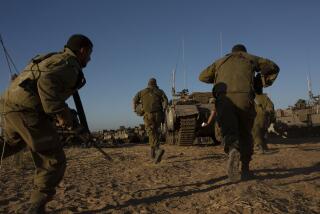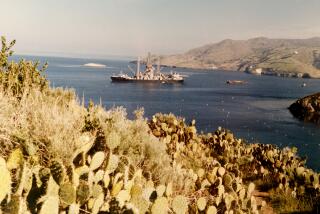America Needs to Get Down and Fight Dirty With Terrorists : Let’s Restore CIA Clandestine Services for Covert Operations
- Share via
We are reluctant to acknowledge it, we who have made such comfortable lives for ourselves, but America is in the midst of a prolonged struggle with Palestinian terrorism.
The terrorists for the most part are focusing on commercial aviation, which they have identified correctly as a vulnerable pressure point of the Western economic system. They also strike at U.S. government targets, American businesses overseas and random groups of our citizens. The Abu Nidal apparatus, the same group that carried out the recent Pam Am hijacking in Karachi, staged a September, 1985, grenade attack on Rome’s Cafe de Paris that injured 39, including nine Americans. The attackers proclaimed preposterously that the famous tourist spot was a “den of U.S. intelligence.”
For the moment the Palestinian extremists are operating mainly in Western Europe, the Middle East and Southwestern Asia, but eventually they will expand into the Far East, Africa and Latin America, and perhaps into the United States. They have taken their toll not only in lives but also in altered travel plans, canceled overseas projects and lost marketing opportunities. Terrorism’s effect on our woeful trade balance has yet to be measured, but it plainly is substantial and is certain to grow. The Palestinians’ strategy is remarkably simple: to test the depth of American support for Israel, the willingness of the United States to shed the blood of its citizens “for Israel’s sake.”
Their indiscriminate slaughter has generated a revulsion among Americans that appears, at first blush, to have hurt their cause. But it is far too soon to assess the underlying soundness of their doctrine. Just how many casualties and how much economic hardship is the United States willing to bear in support of Israel? Just how long will it be before we begin chafing under the pressure and feel forced to acknowledge the “reasonableness” of Yasser Arafat if not Abu Nidal? We had best look deep within ourselves in pondering a reply.
What is to be done? The route networks of American carriers are too vast and their resources, both human and financial, too thin to fully protect their aircraft. The terrorists’ technology and their increasing operational competence and inherent ability to dictate the time and place of their attacks combine to give them tremendous advantage.
Clearly we must carry the struggle to the terrorists, but how? Militarily? Repeated Israeli bombings of suspected terrorists’ strongholds have accomplished little. April’s bombing raid against Libya, a notorious supporter of Palestinian terrorism, made us feel good but was equally ineffective. Such aerial attacks are akin to firing a mortar at widely dispersed and well camouflaged swarms of insects.
Insects are suppressed by disrupting their breeding cycle; so, too, with terrorists. We should focus not on dispersed hit men but on their trainers, suppliers and commanders. We should descend into their nether world, get as close as we can, then neutralize them through capture or elimination. We should fight covert operatives with covert operatives.
Our problem, and it is a serious one, is that a dozen years ago, with astounding absence of foresight, we largely did away with the covert arm of our government, the Central Intelligence Agency’s clandestine services. While the Reagan Administration has done its best to revitalize the service, it unwisely has chosen to expend a good deal of its effort and credibility in a most uncovert manner in Nicaragua. The agency has suffered as much from its supporters as it has from its critics.
It isn’t too late to develop a response to terrorism, but we had best do it quickly. We should rationalize a tangle of laws and regulations that allow the President to order bombing runs against urban centers, with numerous civilian casualties, but forbid the surgical elimination of an identified terrorist known to have murdered American citizens. We should instruct congressmen, now spoiling for action, on the meaning of discreet supervision of an intelligence service, and advise the Administration on the fine distinction between the words overt and covert.
Many people warn that unleashing the clandestine services against terrorists would undermine our legal system, imperil our rights, erode our moral fiber. Nonsense! Our political system has survived the strains of full-scale war. Surely it can withstand covert engagement.
There will in fact be no more crucial test of our political system in the remaining years of this century than our response to terrorism. If we fail to meet the challenge, we have but two alternatives: We can forfeit to barbarians the determination of our foreign policy--which, incidentally, won’t do much for our moral fiber. Or we can oblige our citizens to travel and conduct business within an ever-shrinking cocoon.
More to Read
Sign up for Essential California
The most important California stories and recommendations in your inbox every morning.
You may occasionally receive promotional content from the Los Angeles Times.













